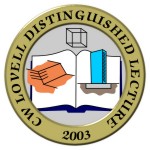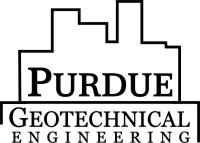
7th C.W. Lovell Distinguished Lecture
| - |
October 21, 2008

David M. Potts
Using Numerical Analysis in Geotechnical Engineering Practice
The development of numerical analysis and its application to geotechnical problems over the past 20 years have provided geotechnical engineers with an extremely powerful analysis tool. However, although the use of such analysis is becoming widespread, there is all too often evidence of bad practice. Part of the reason for this is a lack of education and of guidance, especially from codes of practice, as to appropriate use of such methods of analysis. Clearly, some form of initiative is required to promote good practice and allow the full potential of this analysis tool to be realized, both from a safety and an economy prospective. This lecture begins by reviewing the key advantages of numerical analysis over conventional analysis tools in the design process. It then uses examples from engineering practice to illustrate some of the short comings and pitfalls that can be encountered when using numerical analysis. Most of these are related to the choice of an appropriate constitutive model for the soil and/or of the manner in which the real problem is idealized for analysis purposes.
About David M. Potts
| - |
After graduation from Kings College, London, Professor Potts undertook research at Cambridge University into the collapse of shallow tunnels which involved extensive experimental and analytical studies. From Cambridge he went to the Shell Research Laboratories, Rijswijk, Holland where he worked on experimental and theoretical problems involved in the cyclic loading of clay, on the development of numerical methods for analyzing the foundation behavior of marine gravity structures, on the stresses in oil well casings, and on the stability of offshore pipelines.
Since 1979 Professor Potts has been a member of the academic staff at Imperial College, responsible for teaching the use of analytical methods in geomechanics and the design of slopes, foundations and earth retaining structures, both at undergraduate and postgraduate levels. He currently holds the position of Deputy Head of Department. Professor Potts has worked extensively on the development of computer methods of analysis and, more particularly, on the application of elasto-plastic finite element programs to the design of real geotechnical structures.
Professor Potts has been author and co-author of more than 220 technical publications.
Areas of Expertise: Geotechnical numerical analysis, constitutive modelling, soil-structure interaction.
Program
| - |
| 10:00 a.m. | |
| 2:00 p.m. - 6:00 p.m. | Symposium (LWSN 1142) |
| 6:30 p.m. | Reception and dinner (West Faculty Lounge, Purdue Memorial Union) (Reservations Required) |
Photos of 7th C.W. Lovell Distinguished Lecture
| - |


